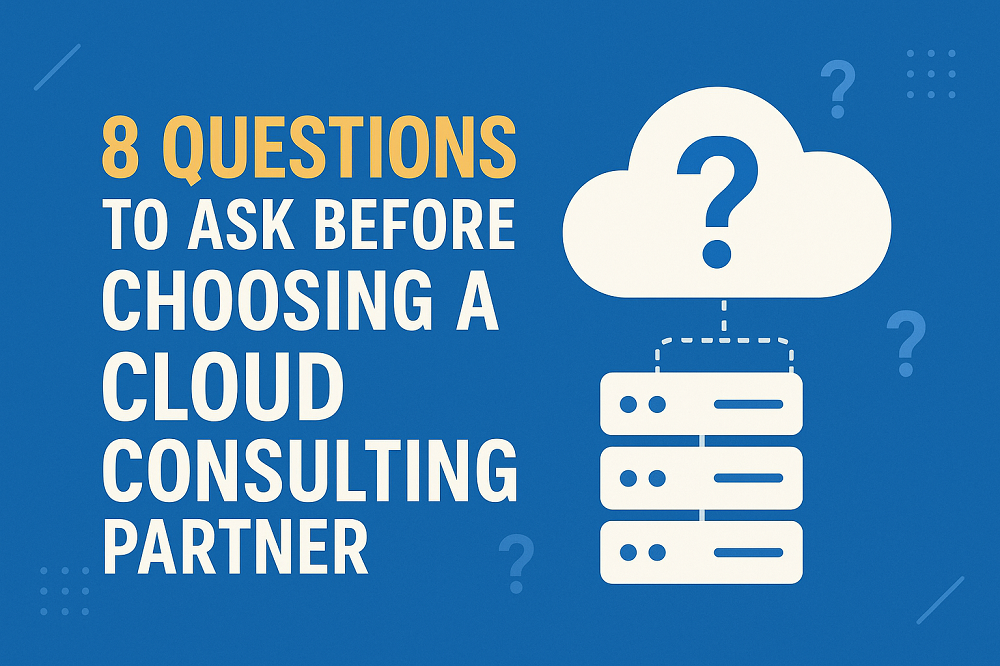Finding a Cloud Consulting Partner that is the most suitable for your company is not just another task on your IT to-do list; it is a decision that can determine whether your digital transformation will be your competitive advantage or an expensive headache. Every vendor claims to be “innovative,” “scalable,” and “future-ready”, so how can you find the real expertise out of the sales talk, which is full of buzzwords? It is a decision with high stakes: if you choose correctly, you will bring in the benefits of agility, security, and long-term savings; on the contrary, if you make the wrong decision, you will be entangled with tech debt for a long time. Before you proceed to sign a contract or endure another shiny pitch presentation, ask yourself—are you asking the right questions?
In this blog, we’ll explore the eight essential questions that will help you distinguish between true partners and mere providers.
1. Defining Your Business Objectives
You are definitely not looking for a good cloud solution as a part of yourDigital Transformation Strategy just because it is new and trendy, though. It most likely has some business purpose that you could easily describe. Here are some examples:
- Increase scalability: Would you need to be able to adjust to the changing requirements quickly without making huge investments in the infrastructure? Enter the new market?
- Optimise cost efficiency: Are you willing to lower IT expenses by using only the resources you need and paying for only them?
- Make the development team happier: Do you want to be able to release new versions of your application regularly, without downtime, and automatically?
- Improve security: Are you looking for better privacy, user activity monitoring, and compliance with industry regulations?
A good partner will not only help you recognize the technology but also take you from a business requirement to a technology solution. Thus, it is crucial to first define your business goals before taking the cloud trip.
2. Expertise, Experience, and Efficiency
Cloud consulting partners with more expertise, experience, and effectiveness should be considered when the potential partners are evaluated. For instance, companies such as Successive Digital, Infosys Cloud Services, Deloitte Cloud Consulting, and Accenture Cloud Solutions have gained significant reputations to be the main contributors to the implementation of cloud strategies by enterprises in the most efficient way.
- Has a track record: You should aim to work with a partner who has a track record of accomplishments and a proven history of successfully implementing cloud solutions for businesses or pain points similar to yours. Consider their case studies and references to evaluate their capabilities.
- References: In the case of large and complex solutions, one of the most common procedures is to look for references among the existing customers. Focus on how the partner’s experience was, whether expectations were met, and if they would do it again.
- Years of experience: Pick a partner with maximum experience as they will be able to foresee the obstacles, supply you with valuable pieces of advice, and offer you a solution tailored to your requirements. Seasoned partners are backed by years of know-how and top standards.
3. Security and Compliance
Usually, the most valuable items in your possession are the data you have saved in the cloud, so you must secure them in the best possible way. That is the reason why security and compliance should be the main concerns while deciding on acloud consulting partner. Your partner must clarify the security practices he is engaged in and the compliance requirements he knows, which are relevant to your industry.
- Industry standards: Check whether your partner follows the guidelines and laws obligatory for the particular industry, such as HIPAA and GDPR.
- Data Processing: Look into the Data of the Partner, look for any Recorded Violations such as Improper Processing of GDPR Data or Security Incident.
- Comprehensive solutions: A reliable partner will provide the total solution products and services necessary for better access control, data encryption, and the regular compliance checks that would be carried out. By doing so, it may be able to provide the customer with the chance to carry out periodic audits, pentesting, and so forth.
- Shared responsibility: You should know what the cloud partner does to avoid security issues, including the prevention, control, and recovery parts. The changes that you have made to your security policy should incorporate security for the network, platform, host, application, database, and storage through the use of different kinds of mechanisms or tools.
A great partner will definitely know your security needs and will always come up with security recommendations even before you ask. Apart from this, they can give you information regarding the infrastructure, not only that of your application but of the whole environment.
4. Service Agreements and Legal Compliance
Make sure cloud partner service agreements are legally compliant by thoroughly checking them. The documents describe the parties’ rights, duties, and expectations.
- Contract review: The organization must ensure that the contracts are meeting its needs and complying with all the legal requirements. That they really cover the activities you require from your partner.
- Liability and data ownership: Identify whether the contract mentions the parties responsible for breaches, failures of services that specifically result in liabilities, data ownership, and confidentiality aspects.
- Compliance with standards: To ensure that all the standards that are related to your business needs will be met, find out from the company how these standards will be met and stated in the contract.
- Scope of service: Be sure to state in the contract exactly what the basic scope of services is and what is not, and thus may be charged additionally for.
5. Range of Services Offered
Have a thorough look at the range of services that the partner has to offer. Do you want a partner that is extremely specialised or one that is comprehensive? A comprehensive cloud partner should be like a Swiss army knife, offering an array of services that cater to the different needs that you might come across in the cloud:
- Design of the architecture: The design should be such a way that it is in line with your company’s needs through the cloud infrastructure.
- Cloud Migration: Migrate your applications and data to the cloud without any hiccups?
- Building Security: Are they going to set up security measures that are strong to protect your cloud environment? Will they discover and fix security weaknesses?
- Optimisation: Tailor your plan to use the cloud to its full potential.
- Ongoing support: Can they provide business continuity support as part of the support services if your business is located in an area prone to natural disasters and, hence, likely to suffer downtime?
- DevOps automation: Can they help you automate your processes so that you can do more with less, which basically means that software development and deployment become faster and more efficient?
- Data Analytics: Can they draw helpful data from your cloud software and make optimization recommendations based on that data?
A good partner will help you through migration and application onboarding, and they will ensure that yourDigital Transformation Strategy will be running smoothly, including in future updates and enhancements.
6. Technical Support: Your Lifeline in the Cloud
Depending on the nature of your cooperation with the partner, you may also be required to set up an appropriate technical support model. If the partner is only an advisor and the daily routine is under your control, the latter requirements will not be a large number. However, if the partner is managing the entire platform or solution for you, it is the other way around.
- Is it available 24/7? Find a partner who is on call 24/7, so that you can immediately tackle any issues that arise.
- Responsiveness: What is their response time? Ensure they deliver a quick service and have good communication between the staff. You should not have to tell the story of who you are and what the problem is each time an incident occurs.
- Communication channels: The good partner selects an option from personalized communication channels, which could be Slack, email, or phone, depending on your preference.
- Proactive monitoring: Such a partner will have a proper level of monitoring incorporated with every solution and collaboration, so that you are informed about any problem and receive an appropriate alert. The problem should be identified and resolved without affecting your business.
7. Partnerships and Certifications: Validation of Expertise
Is a partner that you have chosen an industry leader? What kind of reputation does it have in the community, with other partners, or the cloud provider itself? Do they recommend them?
- Certifications: In line with your cloud provider, look for certifications that are relevant. Examine the expertise level that matters most to you. Having them in your organisation is definitely something, but having them working with you is completely another.
- Partnerships: A relation with a cloud provider like AWS, Google Cloud or Microsoft Azure is classified on the basis of the level of the partnership. Besides the initial competencies, more can be acquired through the partnership in the form of additional skills and specialisations. See where the partner is located on the cloud provider’s website. Are they together in some activities, awards, or case studies with other interesting customers? Do not be surprised if, after requesting a cloud provider, they suggest the best partners who fit your segment and needs.
8. Overall Performance
Think about it, look at your partner from an overall perspective. Assess the overall effectiveness of your partner’sDigital Transformation Strategy. Are they the ones who can actually help you the most? Do they have the necessary skills? Were you convinced by their references, and were you able to get on well with them?
Conclusion
Choosing the right cloud partner is a very high-stakes decision with an impact on the future. The good partner is not only a supplier but also a trusted ally who is aware of your targets and helps you reach them. Think about a partnership that lasts for a long time, where the partner is actively engaged in your progress, innovation, and success on the cloud. This kind of partner will give you more time, money, and peace of mind, while at the same time, they will provide you with access to the latest and greatest technologies and best practices.



